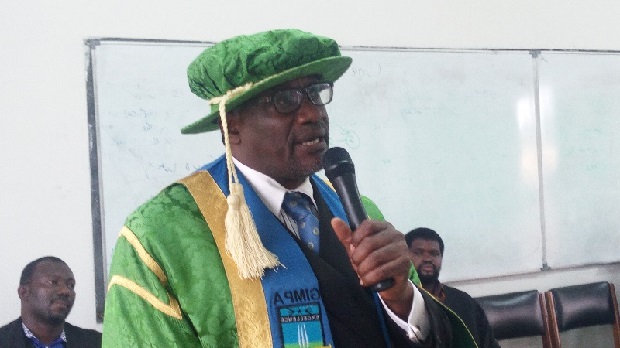Prof. Philip Ebow Bondzi-Simpson
The Rector of Ghana Institute of Management and Public Administration (GIMPA), Prof. Philip Ebow Bondzi-Simpson, has advocated the scrapping of the constitutional provision which supports the appointment of Members of Parliament (MPs) as ministers.
According to him, the two are distinctive roles and burdening one person with these responsibilities affects development.
He made the call whilst delivering an address at the maiden Constitution Day Public Lecture held on Monday, January 7, 2019, at the Ghana Academy of Arts and Sciences.
“I believe that MPs should not be ministers not that there is not a good case for MPs being ministers because in some democracies we do have that but how has it worked?” he asked.
Article 78 (1) of the 1992 Constitution states that majority of ministers must be appointed from Parliament.
But Prof. Bondzi-Simpson was of the view that the practice, which is common in some other countries, hampers development.
“At least if you get it, you are guaranteed your job for the period unless you absent yourself from a number of sittings and you are kicked out but focus on that, be compensated for it and do the work”, Prof. Bondzi-Simpson added
Poor Quality MPs
He warned that parliamentarians must be able to do the job that is expected of them not for the sake of themselves but for the sake of the people they represent.
According to him, parliamentary seats should be allocated in a manner that corresponds to population of the various regions in the country.
The rector lamented that the operations of the Council of State remain opaque; he appealed that the operations of the Council be made open.
Sober Reflections
He urged government to use the Constitution Day Celebration as an occasion not just for resting or for another public holiday, but as an opportunity for sober reflection among the Ghanaian people.
According to him, it should be a Day for sober reflection and public education; it should also be used to re-orient ourselves to improve public service delivery.
He suggested that, annually, the Day should be preceded in every district, metropolitan and municipality with “citizens’ fora”.
According to him, MPs must be able to scrutinize international contracts in a manner that makes sense.
Constitutionalism
The Speaker looked at how constitutionalism is working in the Fourth Republic, its flaws and suggestions to be made for consideration for the people of Ghana to improve upon constitutionalism.
He dwelt with the topic in four parts namely the preliminaries, the context for 1992 Constitution and how it came to being, undertook an evaluation of the provisions of the 1992 Constitution and discussed ways of improving the functional performance of the Constitution.
The rector identified issues like vigilantism, lack of transparency in the disbursement of certain public funds like District Assembly Common Fund, as being problematic for constitutionalism.
He said Ghana’s constitutionalism has been more formal in outlook than functional. He therefore appealed: “As a country, we need to improve upon functionalism to complement formalism.”
National Heroes
He started off by acknowledging those who fought to bring forth the Fourth Republican Constitution.
Such individuals, he said, included President Akufo-Addo, former president John Agyekum Kufuor, J.H. Mensah, Albert Adu Boahen, among others.
He also acknowledged the roles of former President Jerry John Rawlings and the late P.V. Obeng.
Unique Day
Chairperson for the lecture, Justice (rtd) Rose Constance Owusu, in her opening notes highlighted the importance of the Constitution Day lecture and celebration.
According to her, the Day is unique and worth celebrating.
She explained that 7th January is significant to Ghanaians for several reasons; the key reason being that it brought into the fore the Fourth Republican Constitution, and that the date has been institutionalized as the date for swearing into office new presidents for the Republic of Ghana.
She urged Ghana to reap the benefits of its democratic dispensation, stressing that it is important to deepen the country’s democracy.
The chairperson cautioned Ghanaians against taking for granted the peace and stability the state is currently enjoying as a result of a stable democracy since 1992.


